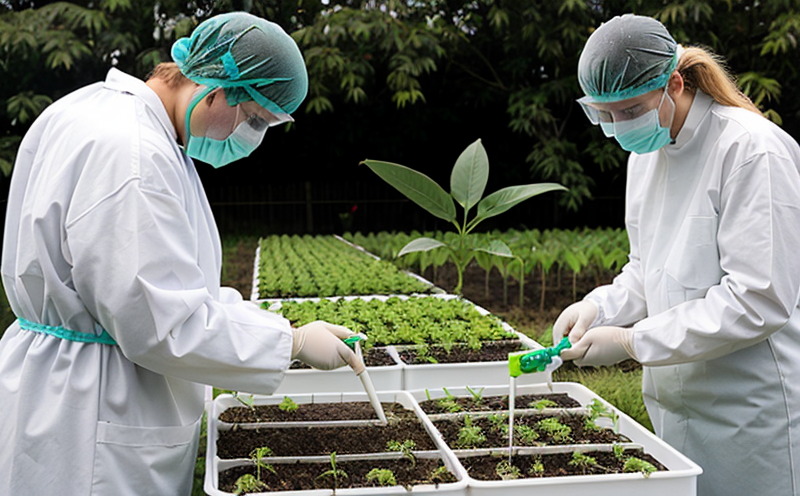Dickeya & Pectobacterium (Soft Rot) Testing
In the realm of agriculture and forestry testing, Dickeya and Pectobacterium are significant pathogens responsible for causing soft rot in plants. Soft rot is a devastating condition that affects both crops and trees, leading to substantial economic losses worldwide. This service focuses on the accurate detection and quantification of these bacteria using advanced laboratory techniques.
The bacteria Dickeya dadantii and Pectobacterium chrysanthemi, among others belonging to this group, are known for their ability to colonize plant tissues, leading to the breakdown of cell walls. This process results in soft rot, which is particularly problematic during harvest season or when conditions favor rapid microbial growth. The presence of these pathogens can lead to significant yield reductions and increased costs associated with crop management.
Our service employs a multi-step approach for identifying Dickeya and Pectobacterium infections. Initially, we collect samples from affected plants, which may include leaves, stems, roots, or fruits depending on the suspected location of infection. The specimens are then prepared according to standard protocols outlined in international standards such as ISO 14768-2:2019 for Pectobacterium and EN ISO 15953-2:2018 for Dickeya. These guidelines ensure that the samples are handled correctly to maintain their integrity throughout testing.
The next stage involves culture-based methods, where we isolate bacteria from the sample using selective media. This step is crucial as it helps differentiate between Dickeya and other closely related pathogens like Erwinia species. Once isolated, the colonies are further characterized through biochemical tests and molecular techniques such as PCR (Polymerase Chain Reaction) and sequencing to confirm identity.
Advanced diagnostic tools are also used to quantify the level of infection within the plant tissue. Real-time qPCR (quantitative PCR) is particularly effective for this purpose, providing precise counts of pathogen DNA in the sample. This information can help determine the extent of contamination and guide appropriate treatment strategies.
The results from our Dickeya & Pectobacterium testing are provided promptly and comprehensively. Reports include detailed descriptions of the methods used, the findings obtained, along with recommendations for control measures based on current best practices in agriculture and forestry.
Why It Matters
Detecting Dickeya and Pectobacterium infections early is critical for effective management of soft rot diseases. By implementing this testing service, agricultural producers can take proactive steps to prevent the spread of these pathogens in their fields or orchards.
- Prevention of Yield Loss: Early detection allows for timely application of fungicides and other treatments that can mitigate damage caused by soft rot bacteria.
- Quality Control: Ensures harvested produce meets quality standards, thereby protecting brand reputation and customer satisfaction.
- Avoidance of Contamination: Prevents the introduction of pathogens into clean production areas, maintaining a healthy environment for crop growth.
The timely identification and management of Dickeya & Pectobacterium infections contribute significantly to sustainable agricultural practices by reducing reliance on chemical inputs while enhancing overall plant health.
Customer Impact and Satisfaction
- Enhanced Crop Protection: By identifying soft rot pathogens early, farmers can implement targeted interventions that reduce crop loss due to disease.
- Informed Decision-Making: Accurate testing results empower growers to make informed decisions about planting schedules and pest management strategies.
We work closely with our clients to ensure they receive personalized support tailored to their specific needs. Our team provides training sessions on proper sampling techniques and interpretation of test outcomes, ensuring that users have the knowledge required to maximize the benefits of this testing service.
Customer satisfaction is paramount, and we strive to exceed expectations by delivering reliable results quickly and accurately. Positive feedback from satisfied clients has been one of our key drivers for continuous improvement in service delivery.
Competitive Advantage and Market Impact
The ability to reliably detect Dickeya & Pectobacterium can provide a significant competitive edge in the agricultural sector. With accurate identification, farmers can implement more precise control measures, reducing the need for broad-spectrum pesticides that may harm beneficial insects or disrupt ecosystems.
- Market Access: Compliance with international standards ensures that testing results are accepted globally, facilitating easier entry into export markets.
- Sustainability: By minimizing crop losses through targeted treatment plans, this service supports sustainable agricultural practices and contributes to long-term environmental stewardship.
Our commitment to excellence in Dickeya & Pectobacterium testing underscores our dedication to supporting the growth of a resilient and prosperous agriculture industry. Through rigorous quality assurance processes and state-of-the-art technology, we ensure that every test conducted meets or exceeds regulatory requirements.





